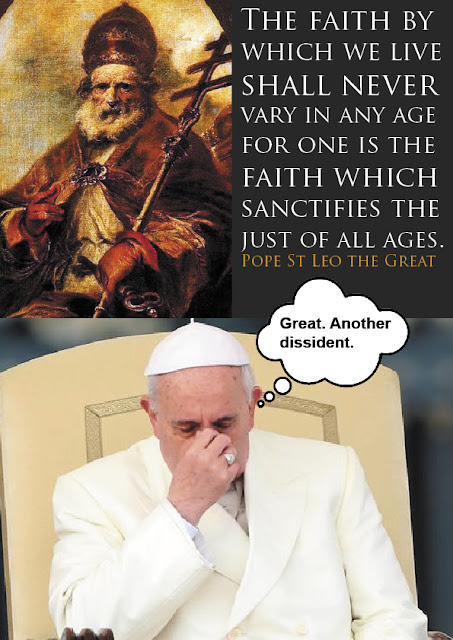
Posted on 11/10/2017 4:07:39 PM PST by ebb tide
Yesterday, 9 November, Cardinal Gerhard Müller, the former Prefect of the Congregation for the Doctrine of the Faith, gave yet another interview, in which he continues to try to explain his own position with regard to the current debate about Pope Francis’ post-synodal exhortation, Amoris Laetitia. With his new statement, he contradicts the claims of the Filial Correction, which, as summarized on the official website of the effort, “states that the pope has, by his Apostolic Exhortation Amoris laetitia, and by other, related, words, deeds and omissions, effectively upheld 7 heretical positions about marriage, the moral life, and the reception of the sacraments, and has caused these heretical opinions to spread in the Catholic Church.” Speaking to the German regional newspaper, Passauer Neue Presse, Cardinal Müller responds to the question as to how it could happen that the pope fell under the suspicion of heresy with the following words:
One may only speak about heresy when a Catholic insistently denies a revealed doctrine that has been presented by the Church in a binding way. Popes and bishops thus would then be heretical if they present to the faithful that have been entrusted to them a highly authoritative teaching which directly and obviously contradicts the Word of God, Holy Scripture, the Apostolic Tradition and the heretofore presented dogmatic decisions of the ecumenical councils or of the popes as the supreme teachers of Christianity. That is, without any doubt, not the case with the few passages of the post-synodal exhortation Amoris Laetitia that have been interpreted in a controversial way. That is what I have tried to show in detail by making use of the binding principles of interpretation of magisterial texts. It can be found in a all-encompassing introduction to a book written by Rocco Buttiglione: Riposte amichevoli ai critici di Amoris Laetitia. [emphasis added]
When later asked once more about Pope Francis’ own position with regard to divorced and “remarried” couples, the German cardinal responds:
“He [Pope Francis] did not want to shake the foundations of the Catholic Faith or to modernize the teaching of Christ, as if it were old-fashioned. It is about how one can assist, in a pastoral way, those persons who find themselves in very difficult marital situations and who often have tragic conditions in their families, and how one can lead them onto a path of insight, discernment, and conversion [Umkehr], at the end of which there also can be the full reconciliation with God and the Church in the Sacrament of Penance, and then also the full participation in the Eucharistic sacrifice with the sacramental Communion.” [emphasis added]
Cardinal Müller also explained that one may not look at the pope as a “man of a political party” who negotiates with other political groups, but, rather, as the “principle of unity of the whole Church and the guarantor of the truth of the Gospels.” For Cardinal Müller, the current debate is about “contradictory interpretations of the same magisterial document [AL].” He later adds that “the unity of the Church will not be obtained by one of the camps eliminating the other camp, but, rather, by dissolving those camps and parties altogether.”
With regard to another controversial topic – namely, the recent papal decision to give more independence to local bishops’ conferences with regard to the translation of liturgical texts – Cardinal Müller makes it clear that “the last authority, in case of doubt, cannot be with the bishops’ conferences. That would destroy the unity of the Catholic Church in faith, in profession, and in prayer.” Cardinal Müller pointed to the past, saying that in some cases “translators consulted by the bishops have watered down biblical and liturgical texts.” In this context, the political categories of “centralization” and “decentralization” are not to be used, according to Müller.
As we said at the beginning of this report, Cardinal Müller, in this new 9 November interview, indirectly contradicted the claim of the Filial Correction, according to which Pope Francis, with Amoris Laetitia, as well as some related omissions and statements, has spread seven heretical propositions. Professor Paolo Pasqualucci, a retired Professor of Philosophy of Law at the University of Perugia (Italy), who is a signatory of the Filial Correction, has kindly provided us with a personal comment on this report about Cardinal Müller’s new interview. Professor Pasqualucci thus states:

so basically he’s saying that its not heretical because Francis only published it once....
sorry, that may very well be correct in a very technical sense of the term “heretical” but it does NOT make Francis’ epistle correct (as i have said before, the Church or any pope has a scriptural basis for modifying slightly the current church position on marriage, but this would be the way to do it...cite the scripture and reason therefrom....ISSUING an almost incomprehensible mish-mash and then refusing to clarify or explain it... is not proper teaching. the Lord is not a god of confusion or disorder, 1 Cor. 14:33.
pastoral care is wonderful but it is not the same thing as correct teaching, sorry.
Disclaimer: Opinions posted on Free Republic are those of the individual posters and do not necessarily represent the opinion of Free Republic or its management. All materials posted herein are protected by copyright law and the exemption for fair use of copyrighted works.